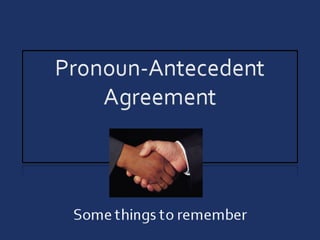
Pronoun agreement
- 2. Pronoun-antecedent Agreement An antecedent is the noun that a pronoun is standing in for. Agreement means a singular antecedent is followed by a singular pronoun. And, a plural antecedent must be followed by a plural pronoun. Dave and Donna played their guitars. Dave and Donna are the antecedents. Since there are two of them, you must use “their. Tom played his saxophone. Tom is the antecedent. Since there is only one of him, you must use “his.”
- 3. Collective Nouns Use a singular pronoun to refer to a collective noun whose parts act as a single unit. The team will play its first game today. Use a plural pronoun to refer to a collective noun whose parts act individually. The jury have not made up their minds yet.
- 4. Indefininte Pronouns Certain words seem plural, but because the number involved is indefinite, they take a singular pronoun. These words are: someone, somebody, everyone, everybody, anybody, nobody, anyone. Everyone going to the concert should remember his or her ticket. As discussed in our lecture, it often makes sense to change the indefinite pronoun to a more definite word to avoid the wordy construction, his or her. Students going to the concert should remember their tickets.
- 5. Pronouns joined by either/or and neither/nor The pronoun that refers to antecedents joined by or or nor should agree with the noun or pronoun nearest to it. Neither the library nor the schools have replaced their books with ebooks yet. “schools” is closet to the pronoun. Either the schools or the library will replace its books with ebooks this year. “library” is closest to the pronoun
- 6. AWord about Gender When the antecedent of a singular pronoun could be either male or female, use the phrase his or her. Each athlete practiced his or her skills. If this sounds wordy, you can change the sentence to make both the pronoun and its antecedent plural. All the athletes practiced their skills.
- 7. Pronoun case There are two forms of pronouns, whose use is dependent upon the rolet they play in sentences. The two forms, or cases, are subject and object case. Subject case pronouns: I,we, you, he, she, they, it, who These pronouns stand in for the subject of the sentence. Object case pronouns: me, us, you, him, her, them, it, and whom These pronouns stand in for, or act as, the direct object of a verb or the object of a preposition in the sentence.
- 8. Pronoun Case examples 1. Us Americans appreciate our freedom. This is incorrect because the sentence needs a subject pronoun. 2. We Americans appreciate our freedom. This is correct because “we” is a subject case pronoun. 3.To who it may concern, I’m leaving. This is incorrect because the sentence calls for an object pronoun. 4.To whom it may concern, I’m leaving. This is correct because “whom” is an object pronoun.
- 9. One final consideration In situations where the sentence involves a comparison using the words than or as, you need to use the subject pronoun.This is tricky to remember because the verb after the comparison is often missing. We are happier than them. “them” is incorrect because the sentence is a comparison and should really read… . We are happier than they (are).
- 10. One final consideration In situations where the sentence involves a comparison using the words than or as, you need to use the subject pronoun.This is tricky to remember because the verb after the comparison is often missing. We are happier than them. “them” is incorrect because the sentence is a comparison and should really read… . We are happier than they (are).